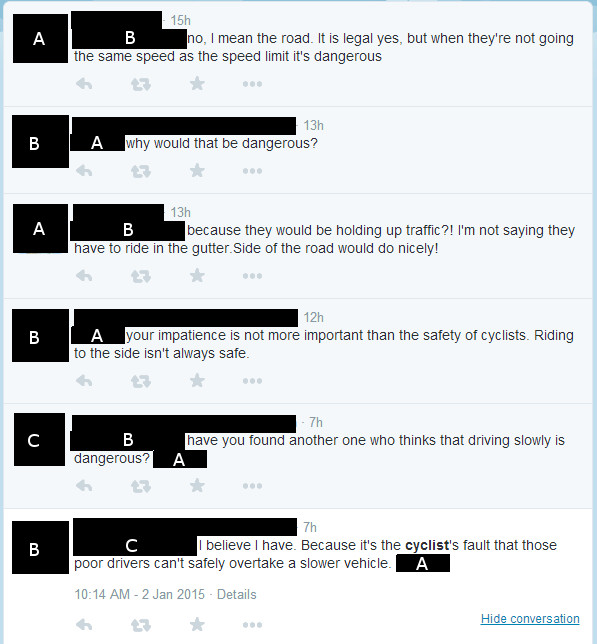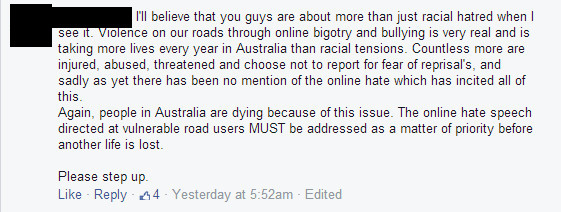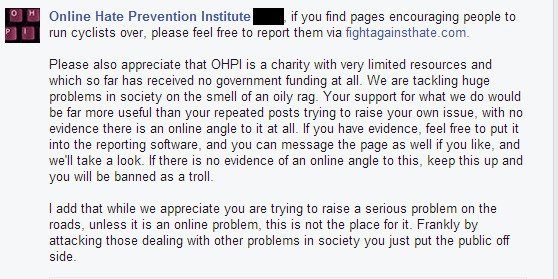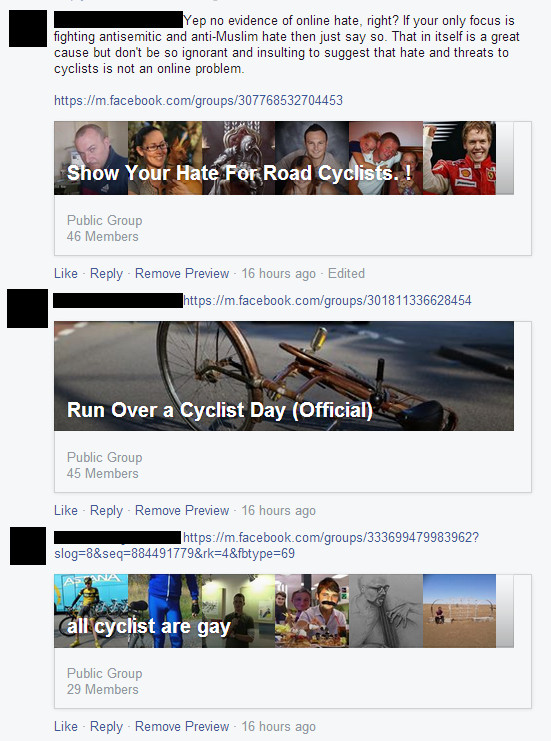Over the last few days the OHPI Facebook page has received a number of comments relating to what is called “bike rage”. These comments come from an organised group of people who are trying to raise issues related to the rights of cyclists to use the roads. There has been significant commentary in the past few year about “bike rage”. OHPI eventually started banning these posts after polite suggestions that they report the problem pages (like everyone else does) and stop hijacking threads on other topics failed to have an impact. Following the bans false and misleading information was posted to at least one Facebook page encouraging cyclists to target OHPI. We are quite familiar with such bullying tactics and deal with attacks against our work on a regular basis. This case is slightly different as the self appointed online leadership on this issue may be making cyclists look aggressive, inconsiderate, and selfish, but they are also raising a issue that is worth examining.
This posts looks at the issue of online hate against cyclists, as these people have been demanding. At the same time, we will also continue to ban those who try to hijack the discussion on other topics on our Facebook page. Those who insist on ignoring the rules and behaving like trolls will be treated as trolls. OHPI is a small charity, we are yet to receive any government funding. Our staff are working excessive amounts of unpaid over time to cope with a wide range of online issues. Those issues range from bullying and racism to efforts to use social media to incite riots against minority groups on our streets. Right now our office is not only closed, but when we reopen we will have a significant backlog of data we need to review and share with police in order to keep the public safe. We cannot stress enough how selfish and inconsiderate people would need to be in order to try an hijack our work through orchestrating campaign to disrupt and attack us just to raise the profile of their issue. We won’t name the people concerned, but we encourage those who support their campaign to have a word with them about their tactics. Their approach will not lead to public support.
There is a serious problem of cyclists being injured or killed. Many of those incidents involve collisions with vehicles. A search for “cyclist” on Twitter showed that in the last 11 hours there was news of multiple cyclist deaths, discussion about a warning to Australia’s Prime Minister to find a safer form of exercise, and numerous posts about issue of cyclists safety on the roads.
Background on “bike rage”
A study in Minneapolis found that in most cases of collisions between drivers and cyclists both the driver and the cyclist had broken the road rules and fault for the accident rested on both parties. A 2013 OECD report found that in Australia cyclists were responsible for 60% of fatal incidents, while a 2010 Monash University report (funded by a cyclist safety charity) found that drivers were responsible for 87% of all incidents they examined. A report from the University of Adelaide in 2013 found that in South Australian incidents which resulted in hospitalization police attributed fault to a driver 79% of the time and to the cyclist 21% of the time. Almost half of these incidents occurred at a T-Junction, the report notes that, “Fail to stand or fail to give way were the most common at fault categories identified for vehicle drivers while inattention was identified for almost half of all bicyclists who were deemed at fault for the crash.” The report also highlighted that 88% of cyclists involved in incidents were male, and that in over half the cases the cyclists were male and aged between 36 to 55. When it came to drivers, men accounted for 53% of the drivers and women 47%; the largest single group of drivers involved in incidents (20% of the total) were women aged between 16 and 25.
Last year Thomas Andersen, a Danish man who has cycled around the world, named Sydney as the city where motorists were most aggressive towards cyclists with multiple people winding down their windows to yell abuse at cyclists. Andersen said the problem in Sydney was partly about poor infrastructure but also about culture.

Following a spate of cyclist deaths in Sydney the NSW roads minister Duncan Gay has been looking at introducing a licensing system for cyclists. He said he needed to be “tougher on car drivers” but that the bad cyclists “that are running lights, crossing over, being aggressive” were a large part of the problem. Cycling New South Wales has acknowledged that “there is a rogue element in any group of people in the community”, but deny this is a significant part of the problem. They went on to say they “don’t condone any riders not obeying the road rules – everyone has to adhere to them. It’s not OK to roll through a red light.”
Tom Stafford, a British psychologist, has argued that there is a problem of hate again cyclists. He says that “motorists hate cyclists because they think they offend the moral order”. Explains that driving is a moral activity controlled by both laws and customs. The process of getting from A to B on the roads is, he explains, “a game of coordination where we have to rely on each other to do the right thing”. Like any game, there is an incentive to cheat, to get the benefits without contributing to the cost, Stafford explains that this is known as the “free rider problem”. Ultimately it predicts that a society should collapse as everyone seeks to maximize their own benefit by free riding off everyone else. He explains the defence we as people have developed against this “cheating”, a defence known as “altruistic punishment”. This involves an individual in the society taking a penalty personally in order, for the good of the group, to call our someone who is free riding.
As humans we are programmed to do object to the free riders not on the basis of logic, but out of anger. When we are standing in line, frustrated, waiting our turn, and someone pushes in… we are likely to call them out. Even if their action has no impact on us. When a cyclist ignores the road rules, they cause a similar reaction. When a cyclist is slowing down the flow of traffic they trigger this anger, not so much for the delay, but for their inability to uphold the shared a agreement that all on the road will go as fast as the speed limit allows in order not to cause others a delay. The same anger can be seen with cars that travel well below the speed limit, either while searching for an address or when the driving is simply our with their sun roof open to cruise along and enjoy the day. On the other hand, when cyclists move through stationary traffic to the front of the queue at the lights, they are seen as cheating having avoided waiting their turn like everyone else.

The frustration of waiting behind a bike moving well below the speed limit, eventually over taking them, only for them to catch up at the lights and get back in front, again slowing the driver down, is the sort of situation which can lead to “bike rage”. The solution is better infrastructure with designated bike lanes and paths. This is something that can be seen in many parts of Melbourne, and one of the reasons it enjoys its “world’s most liveable city” status.

The Online Issue
Tom Stafford has argued that the problem of hate again cyclists is also manifested online. He has highlights how this hate is expressed on Twitter, highlighting a tweet that reads “Had enough of cyclists today! Just wanna ram them with my car”. He argues that such a comment “would get people locked up if directed against an ethnic minority or religion, but it seems to be fair game, in many people’s minds, when directed against cyclists”.
Stafford is right when he highlights that such comments directed against someone on the basis of their race or religion would be treated quite differently. There is a good reason for this. The basis for laws against discrimination targeting people because of their race or religion are connected to fundamental human rights. These are expressed in treaties such as the United Nation’s International Covenant on Civil and Political Rights. It is not a fundamental right to be a motorists or a cyclists. This idea is perhaps more familiar to motorists given the regime of licenses for driving, and the infrastructure the state puts in place to revoke this privilege if it is abused. The Australian Road Rules, a model set of laws on which state laws are based, highlights the bicycle riders are also regulated, though not licensed. The example most familiar to the public are the laws relating to helmets for cyclists; police across Australia do fine cyclists who ignore this rule.
The anger expressed against cyclists online is both an airing of frustration, and a form of “altruistic punishment”. It may be against behaviour that is entirely legal, but breaks with the conventions and good manners that make driving on the road a smooth experience for all involved. Such comments may well target an entire group of people, all cyclists, rather than an individual. In this it is similar to many forms of hate speech, tarring an entire group based on the actions of a member of that group.
Ultimately, it is extremely unlikely that someone will see a bicycle outside someone else’s house and on that basis plan to attack them – just because they are a cyclist. This too differentiates the hate directed against cyclists from the hate that may be directed against people because of their race or religion. Certain online comments could make it more likely that, in the heat of the moment, a frustrated driver who has been exposed to them, might decide the ignore the road rules when behind a cyclist. It may also make it seem more acceptable to yell abuse at cyclists. It’s doubtful that anyone who posts that they would like to run cyclists over is serious, but support for such views could potentially lead to incidents on the road. It could also fuel greater aggression in cyclists. There is an argument that such content online could pose a risk to the public and should be removed, while speech highlighting bad behaviour, by both motorists and cyclists, should be protected as it serves an educative effect.
The raising of the issue with OHPI
When the issue of hate targeting cyclists was first raised on the OHPI page we asked those raising it whether there was an online angle to it. We said if there was, they should report it through fightagainsthate.com our new online reporting system. We also expressed some doubt that this was an online problem as it mostly took place on the roads in real time. This said, if the evidence was there, we asked people to report it so we could (eventually) look into it.
The posts kept coming, trying to use the OHPI page and audience to promote this issue. The effect of such action is to divert attention away from the message we were trying to present at that point in time. This both derailed discussions, and took up staff and volunteer time in moderation when people should have been relaxing over the Christmas / New Year holidays. At OHPI we are quite used to people wanting to direct our activities, demanding we focus on this and not that. We post on one type of hate, and someone inevitably responds, “yeah, well what are you doing about x?” Most of the time we have done work on X, either the person hasn’t looked, or they are part of the problem we have just been highlighting and want to deflect attention from it, or they just want all the attention focused on their issue and don’t care at all about anything else. Normally such posts stop when we tell people how they should report content, or when we highlight that we have already dealt with the issue or will look into it.
In this case, instead of taking this on board, multiple people, with connections to each other, started hijacking multiple threads asking “what are you doing about the hate against cyclists”. Some were polite, but others were less polite rubbishing our work if we didn’t deal with their concerns immediately. After giving the same reply multiple times, and seeing the same people ignore it and post their message again and again, we started to ban them. This is our standard response against trolls. The response was triggered when we started looking into the users and spotted discussion coordinating what amounted to an attack on OHPI.

I banned them after looking into two of the people who had made comments about this, and saw some pages focused on the issue they appeared to be running. Those pages may well be tackling a real issue, but the issue was not with online content, it was with the real situation on the roads. More to the point, the way they were doing it was frankly insulting to those who do suffer prejudice. None of that takes away from the issue, but it does mean these are not people behaving in good faith, they are people willing to do “whatever it takes” to make their point.

OHPI is a small charity with very limited resources. Right now we are getting no financial support at all from the Government. Our staff are working serious over time, unpaid, through the holidays, in order deal with as much as we can. We spent 2014 bringing the http://fightagainsthate.com software online so it will be possible for the public to participate in reporting a wide variety of online hate. The software has a number of categories of hate but was also built to allow people to add their own type of hate if they wish. We are already going above and beyond to do everything we do, doing everything everyone would like is frankly impossible. When people ignore our directions on how to notify us of potential content for us to look into, and instead aggressively spam the page, this just wastes our resources. There is an absolute tonne of hate on social media, we could find pages on just about anything… which is why we created the reporting system in the first place. We appreciate that the most recent cyclist posted actually provided links to pages on Facebook that are a problem (an image of some are below) but this is not the way to raise the issue.
More on Twitter
After initially publishing this briefing we posted it to Facebook then to twitter. A number of mentioned showed up on Twitter from the last 24 hours. They were from the same people who have been banned on Facebook. You can see how they twist things round to paint people as “the enemy”. It you won’t do exactly as they demand, they simply make things up.
This last tweet is special. The link goes to a copy of the e-mail that was sent to us. It was in fact this e-mail which led to the briefing being written. The e-mail is itself was polite, but in hind sight perhaps it was only written this way so it would look good when posted publicly on line. It was posted online immediately after being sent without waiting for a reply. A reply was sent in under 14 hours and the majority of that time was spent writing this briefing, which was linked to in the reply. I leave it to the reader to draw their own conclusions. As to hating cyclists, I believe that was another bit they just made up in order to try get more people on side. These are bullying tactics pure and simple. I wonder if they will delete their tweets before people find them?
Summary
- There is a serious issue about safety on the roads between vehicles and cyclists
- There is some spill over online with content targeting cyclists. On Facebook these pages should be removed, but they seem to be small and low impact. There seem to be more of a problem on Twitter, however, this problem also seems to be less acute at the start of the year when people are on holidays (and traffic and pressure on the roads is reduced).
- Problem content on both Facebook and Twitter can be reported to the platforms and then to http://fightagainsthate.com
However, we take issue with:
- People who want to disregard all the positive work we do because we can’t put time into their issue right now
- People ignoring our polite responses asking them to use the systems we provide for reporting and instead trying to hijack other posts on our page to divert the focus
- People disregarding the instructions we gave for reporting content to us and instead claiming we are ignoring their issue and encouraging what amounts to further attacks on our page by others
To those wanting to address this issue, icnluding those who have been banned form our page, please feel free to report any hate speech you see at http://fightagainsthate.com so we can monitor how the platforms respond. We don’t appreciate the tactics you have been using. We have procedures in place for dealing with attacks, we get attacked regularly by haters as you can imagine. Intentionally or not, those wishing to raise this issue have done so in a manner that looks like an attack. We have responded by banning people, as always do when attacked. We strongly suggest those running this campaign rethink their approach. Rather than looking like people wanting to cooperate to address an issue, you’ve come across as aggressive, inconsiderate, and selfish. You won’t solve online issues with such an approach.
NOTE: Updated January 3rd to include some Australian statistics.




















